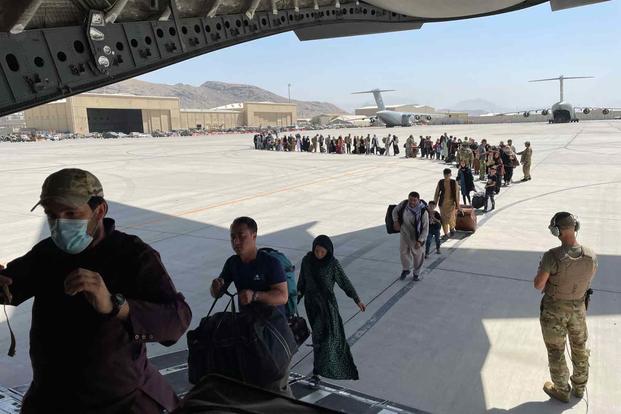The program that allows Afghan allies to immigrate to the U.S. is in danger of running out of visas this summer as approving more of the visas becomes a sticking point in Congress' negotiations over an upcoming government funding bill.
Supporters of the State Department-run Special Immigrant Visa, or SIV, program are pushing to include 20,000 visas in the bill being negotiated now to fund about half of the federal government, including State, for the remainder of fiscal 2024, which started nearly six months ago. But, those supporters say, House Republicans are standing in the way.
Sources briefed on the negotiations told Military.com that House Speaker Mike Johnson, R-La., has over the last week softened his stance, going from opposing any new visas to being amenable to at least a few thousand more. But with the high stakes of potentially abandoning allies who helped the U.S. military during the 20-year war in Afghanistan, backers of the SIV program are still working to keep up the pressure on negotiators to ensure the program doesn't lapse.
Read Next: Two Commanders in Marine Corps' West Coast Infantry School Fired on Same Day
"Following the U.S. withdrawal from Afghanistan and the Taliban takeover, the need to expeditiously process SIV applications and ensure that all eligible applicants have a visa has never been more urgent," a bipartisan group of 15 senators, led by Sen. Jeanne Shaheen, D-N.H., wrote in a letter Thursday to Senate leadership.
"There have been credible reports of hundreds of Afghans killed while waiting for the SIV application to be processed," the 10 Democratic and five Republican senators added. "Congress must ensure that the visas are available to bring every eligible SIV applicant -- including the surviving spouse in cases where our Afghan ally has already been killed -- to the United States."
The Afghan SIV program was created in 2009 to give Afghans who served as interpreters for the U.S. military, as well as their family members, a path to escape Taliban threats to their lives and resettle in the U.S.
Since its inception, the program has been beset by slow processing, exacerbated by low staffing at the State Department and shoddy record-keeping by the military or contractors, making it difficult for some Afghans to prove their work with U.S. troops. The issues came to a head in 2021 as the U.S. military withdrew from Afghanistan after 20 years, with tens of thousands of SIV applicants still waiting for their visas.
Since then, the State Department has been working to speed up the process. Those efforts have paid off, with the department saying it now issues about 1,000 visas per month.
But the faster processing also means running out of visas more quickly. With about 7,000 visas remaining, lawmakers who support the program say the State Department expects to run out as soon as August.
The SIV program has come close to running out of visas before, only for Congress to reach a resolution at the last minute. But a Senate aide said this year feels more precarious than the previous close calls.
“There is still very strong bipartisan support, bicameral support,” the aide told Military.com. “I think that the issue right now is that we need the political will to be there to get this done, and there are a lot of things that require political will right now from leadership.”
Johnson's office did not respond to a request for comment Thursday on his position on approving more visas in the funding bill.
As of September, more than 67,000 completed SIV applications were awaiting what's known as chief of mission approval, according to the State Department's most recent quarterly report on the program. Another nearly 11,000 had received that approval and were awaiting their visa interviews.
The Biden administration asked for the 20,000 visas now at the center of negotiations in its fiscal 2024 budget request and reiterated that request in the fiscal 2025 budget request released at the beginning of this week.
"We are clearly going to hit this cap, and we need statutory approval to raise the cap," State Department spokesperson Matthew Miller said at a press briefing last week. "We have urged Congress to raise the cap and allow us to meet our obligation to those Afghans who put their lives on the line for the United States, make sure that they are not forgotten."
While there are still several months before the State Department expects to run out of visas, the government funding bill being negotiated now is expected to be the last must-pass bill Congress approves before then, adding urgency to the talks.
With funding for the agencies covered in the bill running out a week from Friday, lawmakers are aiming to finalize an agreement by this weekend to avoid a partial government shutdown next weekend.
If lawmakers don't include the visas in the spending bill, it would be the second time in as many months that Congress has failed to act to help Afghan allies. A separate proposal to allow Afghans who were evacuated to the U.S. in 2021 to apply for green cards was dropped from a bill the Senate approved last month after it became entangled in U.S. border politics.
"I understand there's an election coming up. I understand that Republicans have some gymnastics to do around immigration. But this isn't really an immigration issue," said Shawn VanDiver, a Navy veteran and president of the #AfghanEvac coalition, an umbrella organization for hundreds of nongovernmental groups that help evacuate Afghans. "This is a national security issue. And it's an issue for our veterans. For everybody who ever served and who will ever serve, how our Congress keeps its word with regard to the folks that are going to serve alongside us matters."
Related: Support for Afghan Allies Sidelined Yet Again Despite Push from Veterans













